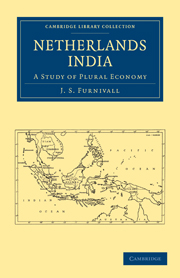Book contents
- Frontmatter
- INTRODUCTION
- Contents
- TERRITORIAL DIVISIONS
- NETHERLANDS INDIA
- AUTHOR'S PREFACE
- LIST OF GENERAL REFERENCES
- GLOSSARY
- MEASURES AND CURRENCY
- THE MALAY ARCHIPELAGO, IN COMPARISON WITH EUROPE
- Chapter I INDONESIA, TO 1600
- Chapter II THE EAST INDIA COMPANY, 1600–1800
- Chapter III THE YEARS OF CONFUSION, 1795–1815
- Chapter IV THE YEARS OF UNCERTAINTY, 1815–1830
- Chapter V THE CULTURE SYSTEM, 1830–1850
- Chapter VI THE TRANSITION TO LIBERALISM, 1850–1870
- Chapter VII LIBERALISM, 1870–190
- Chapter VIII EFFICIENCY, WELFARE AND AUTONOMY
- Chapter IX ADMINISTRATIVE AND POLITICAL REFORMS
- Chapter X ECONOMIC PROGRESS
- Chapter XI SOCIAL ECONOMY
- Chapter XII SOME EFFECTS OF THE CRISIS OF 1929
- Chapter XIII PLURAL ECONOMY
- INDEX OF REFERENCES
- GENERAL INDEX
Chapter VIII - EFFICIENCY, WELFARE AND AUTONOMY
Published online by Cambridge University Press: 07 September 2010
- Frontmatter
- INTRODUCTION
- Contents
- TERRITORIAL DIVISIONS
- NETHERLANDS INDIA
- AUTHOR'S PREFACE
- LIST OF GENERAL REFERENCES
- GLOSSARY
- MEASURES AND CURRENCY
- THE MALAY ARCHIPELAGO, IN COMPARISON WITH EUROPE
- Chapter I INDONESIA, TO 1600
- Chapter II THE EAST INDIA COMPANY, 1600–1800
- Chapter III THE YEARS OF CONFUSION, 1795–1815
- Chapter IV THE YEARS OF UNCERTAINTY, 1815–1830
- Chapter V THE CULTURE SYSTEM, 1830–1850
- Chapter VI THE TRANSITION TO LIBERALISM, 1850–1870
- Chapter VII LIBERALISM, 1870–190
- Chapter VIII EFFICIENCY, WELFARE AND AUTONOMY
- Chapter IX ADMINISTRATIVE AND POLITICAL REFORMS
- Chapter X ECONOMIC PROGRESS
- Chapter XI SOCIAL ECONOMY
- Chapter XII SOME EFFECTS OF THE CRISIS OF 1929
- Chapter XIII PLURAL ECONOMY
- INDEX OF REFERENCES
- GENERAL INDEX
Summary
1. The New Colonial World. By 1900 Liberalism was an outworn creed. But yet it had not failed, any more than the Culture System failed. Just as the Culture System, created by the genius of Van den Bosch to meet the needs of 1830, was swept away by the forces which it called into existence, so was it with the Liberal System, originating in the needs of 1870. It released forces, moral and material, creating a new colonial world, which teemed with problems that on Liberal principles were insoluble.
In this new world the balance of economic power in Java no longer lay with Government but with private capital. In 1870 the few wealthy planters were isolated individuals, but in 1900 the far larger and far wealthier non-official community was directed by a few powerful corporations which could easily take common action to protect their interests; the economic structure was no longer individualist but capitalist. Colonial capital had furnished a Governor-General in s'Jacob (1881–84) and a Colonial Minister in Cremer (1897–1901), and it dominated the whole administration, from the Council of India to the village headman. In 1870 the planters looked to the States-General for support against the Indian Government, but in 1900 colonial capital, closely linked up with capital at home, was impatient of control by the States-General; except for the check of public opinion in the States-General it was all-powerful.
- Type
- Chapter
- Information
- Netherlands IndiaA Study of Plural Economy, pp. 225 - 256Publisher: Cambridge University PressPrint publication year: 2010First published in: 1939



